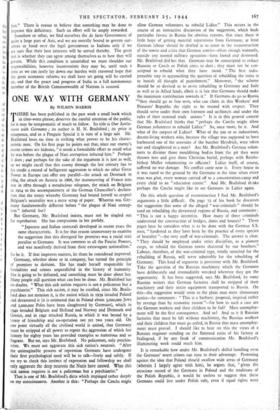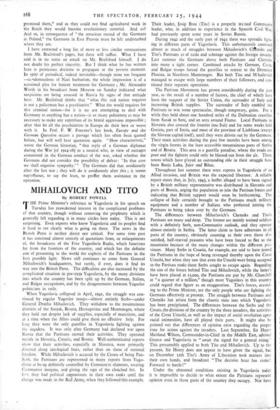ONE WAY WITH GERMANY
By WILSON HARRIS
THERE has been published in the past week a small book which in time-worn phrase, deserves the careful attention of the public, for it may be symptomatic of much to follow. Its title is Our Settle- ment with Germany ; its author is H. N. Brailsford ; its price is ninepence, and as a Penguin Special it is sure of a large sale Mr. Brailsford loses no time in striking what proves to be his charac- teristic note. On his first page he points out that, since our enemy's recent crimes are hideous, " it needs a formidable effort to recall what he was before the plague of Nazi corruption infected him." Perhaps it does ; and perhaps for the sake of the argument it is just as well, or we might recall that this enemy through the last century has to his credit a record of belligerent aggression to which no other Great Power in Europe can offer any parallel—the attack on Denmark in 1864, the attack on Austria in a866, the manoeuvring of France into war in 1870 through a mendacious telegram, the attack on Belgium in 1914 to the accompaniment of the German Chancellor's declara- tion that the treaty whereby Germany had bound herself to-respect Belgium's neutrality was a mere scrap of paper. Wherein was Ger- many fundamentally different before " the plague of Nazi corrup- tion" infected her?
But Germany, Mr. Brailsford insists, must not be singled out for reprobation. She has companions in her perfidy.
" Japanese and Italian statecraft developed in recent years the same characteristic. It is for that reason unnecessary to examine the suggestion that this disregard for promises was a racial trait peculiar to Germans. It was common to all the Fascist Powers, and was manifestly derived from their extravagant nationalism."
So be it. If that improves matters, let them be considered improved.
Germany, whether alone or in company, has turned the principle of promises to derision. She has made herself responsible for bestialities and crimes unparalleled in the history of humanity. She is going to be defeated, and something must be done about her. Many people still question what can best be done. Mr. Brailsford has no doubts. " What this sick nation requires is not a policeman but a psychiatrist." This sick nation, it may be recalled, since Mr. Brails- ford does not mention it, is the nation which in 1939 invaded Poland and devastated it (it is estimated that in Poland about 3,000,000 Jews and 2,000,000 Poles have been slaughtered by Germans), which in 194o invaded Belgium and Holland and Norway and Denmark and Greece, and in 1941 attacked Russia, to which it was bound by a treaty of friendship and co-operation not yet two years old. On one point virtually all the civilised world is united, that Germany must be stripped of all power to repeat the aggression of which her history for eighty years has provided examples so numerous and so flagrant. But no, says Mr. Brailsford. No policemen, only psychia- trists. We must not aggravate this sick nation's neurosis. "After the unimaginable process of repression Germans have undergone their first psychological need will be to talk—freely and safely. If we try to check this instinct of expression and fellowship we shall only aggravate the deep neurosis the Nazis have caused. What this sick nation requires is not a policeman but a psychiatrist."
That is one of Mr. Brailsford's dicta which impinged rather deeply on my consciousness. Another is this: "Perhaps the Czechs might
allow German volunteers to rebuild Lidice." This occurs in the course of an instructive discussion of the suggestion, which finds particular favour in Russia for obvious reasons, that since there is little hope of getting material reparations from Germany, at least German labour should be drafted in to assist in the reconstruction of the towns and cities that German armies—often enough wantonly, outside any normal military operation—have looted and destroyed. Mr. Brailsford disl kes that. Germans may be conscripted to reduce Russian or Czech or Polish cities to dust ; they must not be con- scripted to rebuild what they have razed. "The first indis- pensable step in approaching the question of rebuilding the ruins is to banish all thought of punishment." Moreover, " the scheme should be so devised as to assist rebuilding in Germany and Italy as well as in Allied rands, albeit it is fair that Germans should make the maximum contribution towards it." If Germans do go to Russia 'they should go as free men, who can claim in this Workers' and Peasants' Republic the right to be treated with respect. They should serve under their own foremen and architects and under the rules of their restored trade unions." It is in this general context that Mr. Brailsford thinks that " perhaps the Czechs might allow German volunteers to rebuild Lidice." So, once more, be it. And what of the corpses of Lidice? What of the Soo or so industrious, decent-living workers who, because the village was supposed to have harboured one of the assassins of the butcher Heydrich, were taken out and slaughtered to a man? Are Mr. Brailsford's German volun- teers to disinter those mouldering bodies from the pit they were thrown into and give them Christian burial, perhaps with Reichs- bishop Muller volunteering to officiate? Lidice itself, of course, suffered no war damage. No conflict came near it. Every house in it was razed to the ground by the Germans at the time when every man was shot, every woman carried off to a concentration-camp and every child to an " education centre." And Mr. Brailsford thanks perhaps the Czechs might like to see Germans in Lidice again.
On this whole question of reconstruction I find Mr. Brailsford's arguments a little difficult. On page 72 of his book he discusses the suggestion that some of the alleged " war-criminals " should be used on rebuilding the devastated regions of Russia, and comments: " This is not a happy invention. How many of these criminals understand the construction of bridges, dams and houses? " Three pages later he considers what is to be done with the German S.S. men, " hardened as they have been by the practice of every species of brutality "—the very stuff of war-criminals. The answer is clear. " They should be employed under strict discipline, as a pioneer corps, to rebuild the German towns shattered by our bombers." Labour, therefore, of the war-criminal type, totally unsuited for the rebuilding of Russia, will serve admirably for the rebuilding of Germany. This kind of argument is persistent with Mr. Brailsford. Take the question of the Russian machinery which the Germans have deliberately and irremediably wrecked wherever they got the opportunity. It has been suggested, says Mr. Brailsford, by some Russian writers that German factories shall be stripped of their machinery and their entire equipment transported to Russia. On this—the suggestion would seem to the plain man mere elementary justice—he comments: "This is a barbaric proposal, inspired rather by revenge than by economic reason "—for how in such a case are the German workers and their children to be fed? Mass unemploy- ment will be the first consequence. And so? And so it II Russian factories that must be left without machinery, the Russian workers and their children that must go unfcd, in Russia that mass unemploy- ment must prevail. I should like to hear on this the views of a Russian engineer standing on the flattened ruins of his factory at Stalingrad, if by any freak of communication Mr. Brailsford's illuminating work could reach him.
It is remarkable how under Mr. Brailsford's skilful handling even the Germans' worst crimes can turn to their advantage. Protesting against the idea that Poland should swallow wide areas of Germany (wherein I largely agree with him), he argues that, " given the atrocious record of the Germans in Poland and the traditions of the Polish Republic, it would be useless to suggest that thew Germans could live under Polish rule, even if equal rights were promised them," and as they could not find agricultural work in the Reich they would become revolutionary material. And so? And so, in consequence of " the atrocious record of the Germans in Poland," the Germans in East Prussia must be left undisturbed where they are.
I have extracted a long list of more or less similar extenuations from Mr. Brailsford's pages, but these will suffice. What I have said is in no sense an attack on Mr. Brailsford himself. I do not doubt his perfect sincerity. But I think what he has written here is pernicious doctrine to propagate at the present moment. In spite of periodical, indeed inevitable—though none too frequent —condemnations of Nazi barbarism, the whole impression is of a sustained plea for lenient treatment for Germany ; Mr. Alexander Werth in his broadcast from Moscow on Sunday indicated what suspicions are being aroused in Russia by signs of that attitude here. Mr. Brailsford thinks that " what this sick nation requires is not a policeman but a psychiatrist." What the world requires for this criminal nation—for it is no use attempting to deal with Germany as anything but a nation—is as many policemen as may be necessary to make any repetition of its brutal aggression impossible ; after that let all the psychiatrists in Europe do their best or worst with it. In Prof. F. W. Foerster's last book, Europe and the German Question occurs a passage which has often been quoted before, but will well bear quotation again. " How characteristic," wrote the German historian, " that reply of a German diplomat during the War [of 1914-181 to a neutral who, in view of outrages committed in the German conduct of the war, asked whether the Germans did not consider the possibility of defeat : ' In that case we shall organise sympathy." The Germans did that assiduously after the last war ; they will do it assiduously after this ; it seems superfluous, to say the least, to proffer them assistance in the operation.



























 Previous page
Previous page